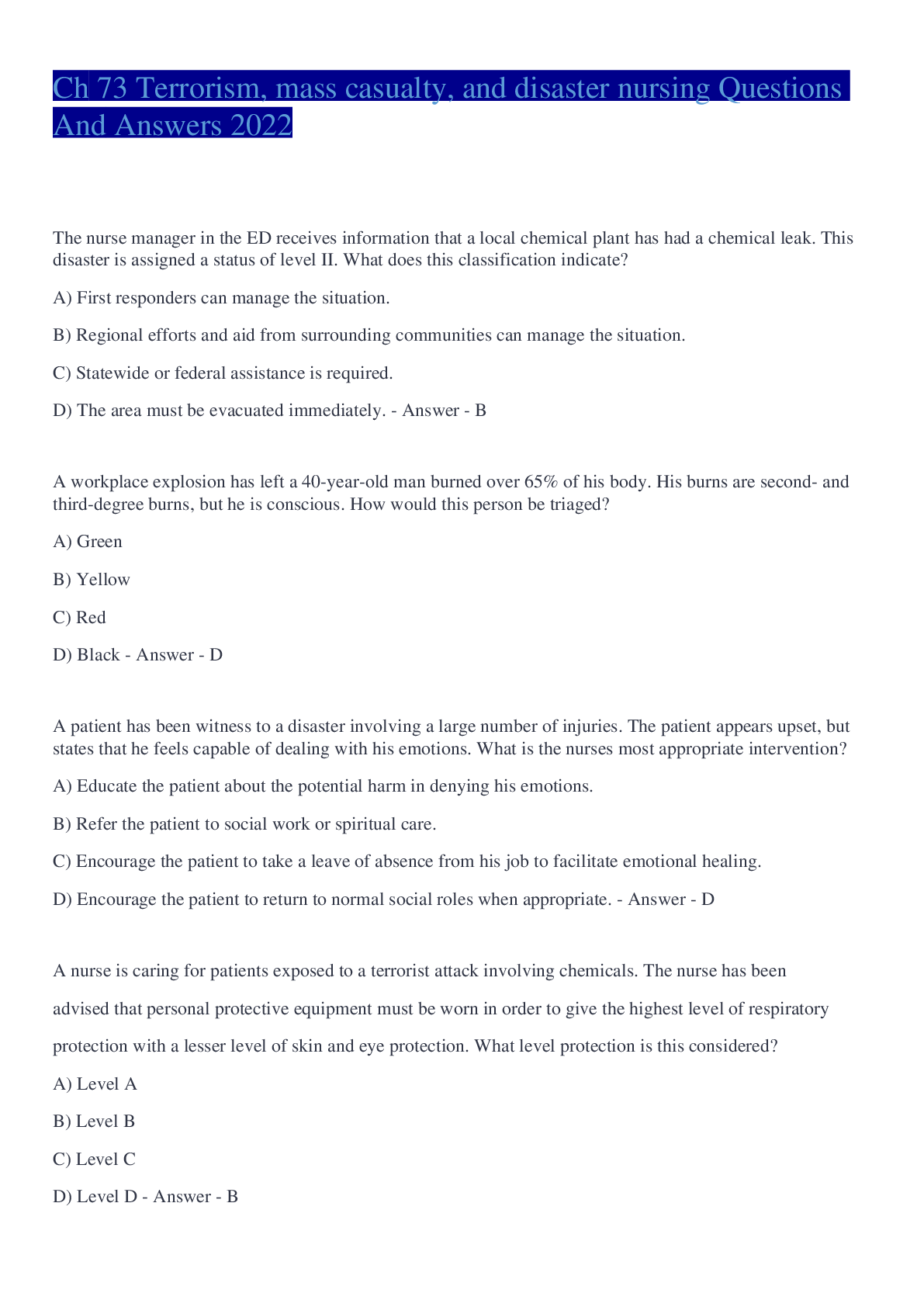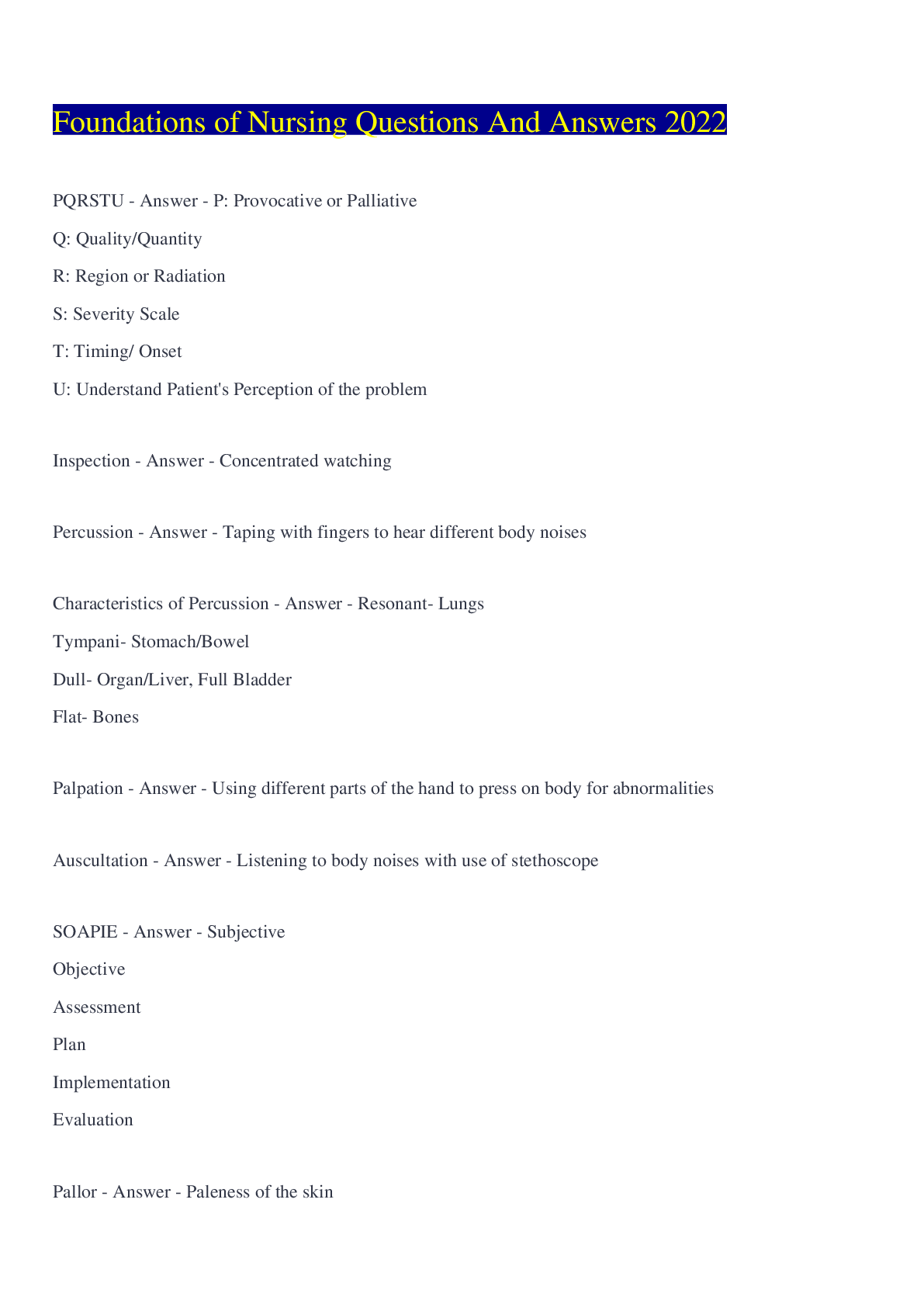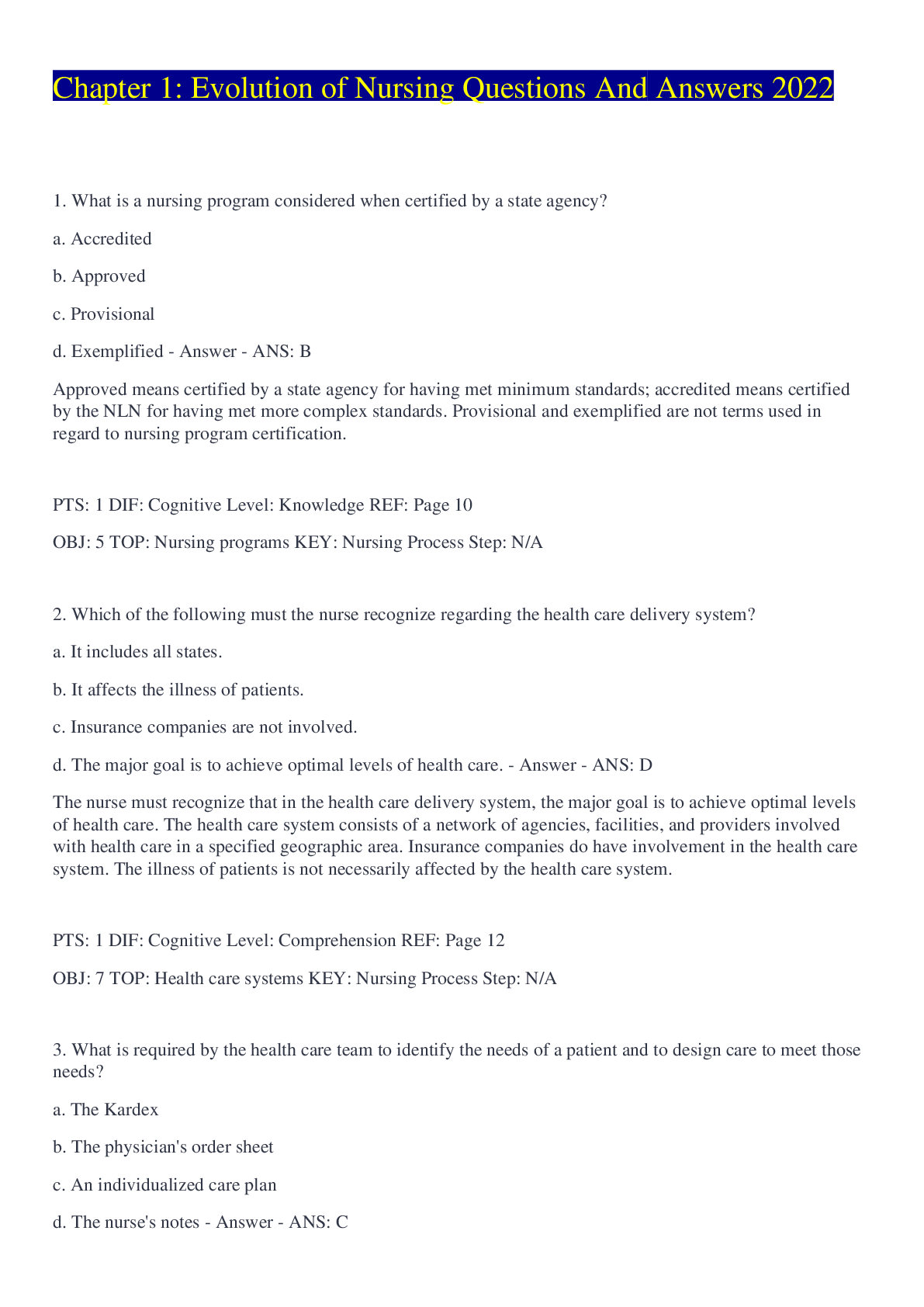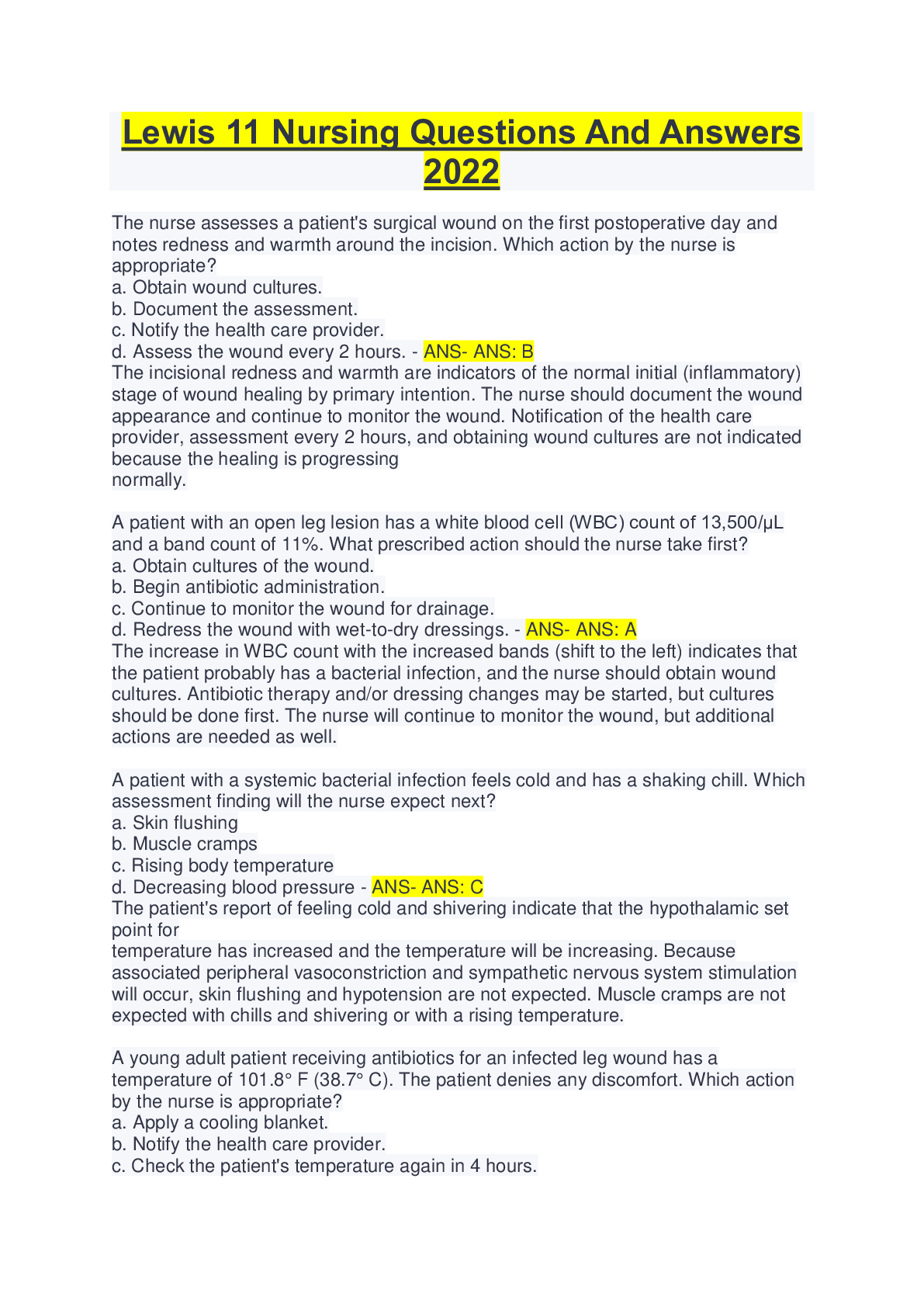*NURSING > EXAM > AMNH Genetics, Genomics, Genethics for Nursing Questions and Answers for AMNH Quiz (All)
AMNH Genetics, Genomics, Genethics for Nursing Questions and Answers for AMNH Quiz
Document Content and Description Below
AMNH Genetics, Genomics, Genethics for Nursing Questions and Answers for AMNH Quiz Question 1 A patient is 34 years old and concerned about possibly being a carrier for HNPCC because his fath... er died of colon cancer at 39, his father’s sister died of colon cancer at age 41, and his brother (aged 37) now has colon cancer. The brother’s testing is negative for all the known mutations associated with inherited forms of colon cancer. How should this patient be counseled about his risk for colon cancer? Select one: a. Explain that testing for him would be of no benefit because of the current test limitations but that his family history does place him a high risk. b. Explain that his risk is not related to his brother’s diagnosis because he did not inherit any genes from him but that since his father is a first-degree relative, testing should be considered. c. Explain that because the brother with cancer is negative for these gene mutations, this cancer is most likely sporadic and his risk is the same as general population risk. d. Explain that he could benefit from testing even though his brother is negative for these mutations because reduced penetrance might account for his negative status. Question 2 Which type of genetic testing is the most sensitive method for detecting any mutation in a specific gene? Select one: a. Direct DNA sequencing b. Immunohistochemistry c. Fluorescence in situ hybridization d. Banded chromosomal analysis Question 3 Which tissue is most likely to provide an adequate DNA sample for genetic testing? Select one: a. A mummy’s tooth b. Nasal epithelial cells c. Mature red blood cells d. Distal ends of hair shafts Question 4 Which lethal cardiac arrhythmia can occur as a complication of long QT syndrome? Select one: a. Atrial node reentry tachycardia b. Prolonged atrial fibrillation c. Torsade de Pointes d. Mitral valve prolapse Question 5 What would be the expected response to a skin injury if the involved tissue had lost the normal cell characteristic of contact inhibition? Select one: a. Excessive growth of replacement tissue b. Replacement with scar tissue rather than skin c. Failure of the wound to close d. Displacement of skin cells into other body tissues Question 6 What would be the patient’s response to a normal drug dose that because of a genetic variation in an enzyme that prepares the drug for elimination results in a blood drug level that is below the minimum effective concentration (MEC)? Select one: a. The drug’s duration of action is longer than expected. b. The risk for toxic side effects is increased. c. Drug entry exceeds drug elimination d. The intended response fails to be produced. Question 7 Which statement best describes the role of tumor suppressor genes in cancer development? Select one: a. Tumor suppressor genes control or modify the activity of oncogenes, reducing the risk for cancer development. b. The presence of tumor suppressor genes increases the risk for gene damage by environmental carcinogens. c. Tumor suppressor genes are a type of oncogene that is only active in germ line cells and tissues. d. Tumor suppressor genes reduce/suppress immune function, increasing the risk for cancer development. Question 8 What is the best description of the genetic contribution to onset of autism? Select one: a. Autism spectrum is caused by a single gene mutation in most, but not all, cases. b. Known causes of autism spectrum include copy number variants and chromosomal problems. c. Autism spectrum disorders have a much stronger environmental input than genetic input to expression of the phenotype. d. Exposure to a teratogen can be a cause of autism spectrum in many cases. Question 9 What should be told to the patient who has been found to have a genetic mutation that increases the risk for colon cancer and says he does not want any of his family to know about this result? Select one: a. “It is not necessary to tell your siblings because they are adults, but you should tell your children so they can be tested before they decide to have children of their own.” b. “It is not required that you tell anyone about this result; however, because your siblings and children may also be at risk for colon cancer, you should think about how this information might help them.” c. “It is your decision to determine with whom, if anyone, you share this test result; however, if you do not tell any of your family members and they get colon cancer, you would be responsible for their developing the disease.” d. “It is required by law that you inform your siblings and your children about this result so that they also can be tested and monitored for colon cancer.” Question 10 Why do genetic counseling programs include extensive courses on laboratory methods in genetics? Select one: a. To help patients understand testing procedures and results b. To be able to draw blood proficiently and safely c. To perform standard karyotyping on routine blood specimens d. To serve as a backup genetics technician in small laboratories Question 11 In which body or cell area are most genes in humans located? Select one: a. Mitochondrion b. Nucleus c. Plasma Membrane d. Cytoplasm Question 12 Why is pharmacogenetics/pharmacogenomics of particular interest in treating patients with psychiatric/mental health problems? Select one: a. Genetics restricts patients to only one drug in each classification b. Psychotropic medications have few side effects. c. Most psychiatric illnesses are single gene disorders with predictable drug responses. d. Psychiatric medications may be effective in only a small group of patients. Question 13 Which type of body tissue has the highest risk for cancer development? Select one: a. Bone tissue because its absorption of radiation is cumulative b. Connective tissue that remains functional throughout life c. Any tissue that retains the ability to divide d. Brain tissue because it does not respond well to injury Question 14 What term is used to describe the gene-to-gene interaction in which the action of one gene modifies the expression of a different gene? Select one: a. Epigenetic penetrance b. Genomic imprinting c. Heterogeneity d. Epistasis Question 15 Which statement regarding the biology of cancer is always true? Select one: a. Cancer cells arise from normal cells. b. Testicular cancer is strongly associated with excessive masturbation. c. When cancer cells are exposed to air, their growth rate becomes uncontrolled. d. The biggest risk factor for cancer development is having a first-degree relative with cancer. [Show More]
Last updated: 2 years ago
Preview 1 out of 5 pages

Buy this document to get the full access instantly
Instant Download Access after purchase
Buy NowInstant download
We Accept:

Reviews( 0 )
$7.50
Can't find what you want? Try our AI powered Search
Document information
Connected school, study & course
About the document
Uploaded On
Jan 04, 2021
Number of pages
5
Written in
Additional information
This document has been written for:
Uploaded
Jan 04, 2021
Downloads
0
Views
122

.png)






.png)



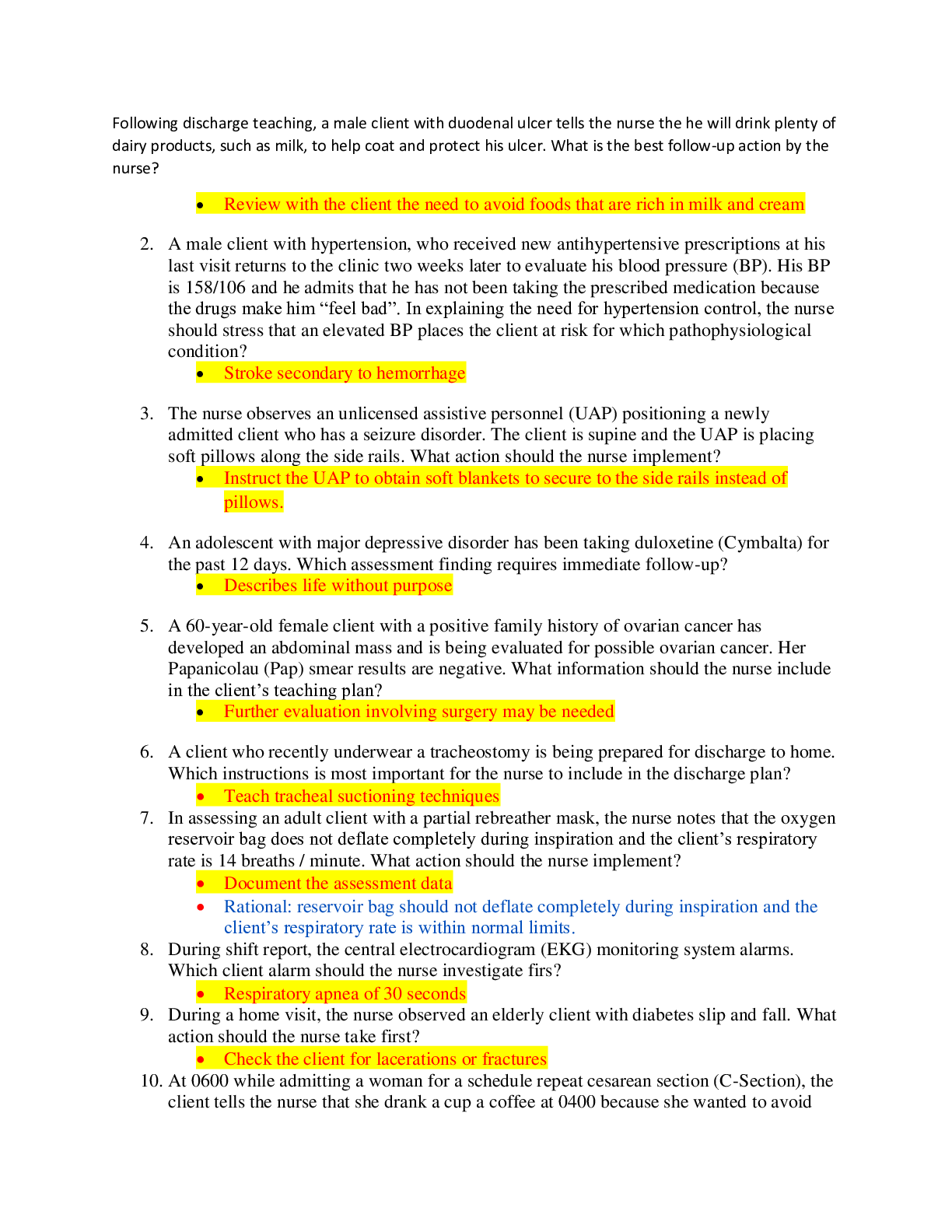

.png)

.png)


